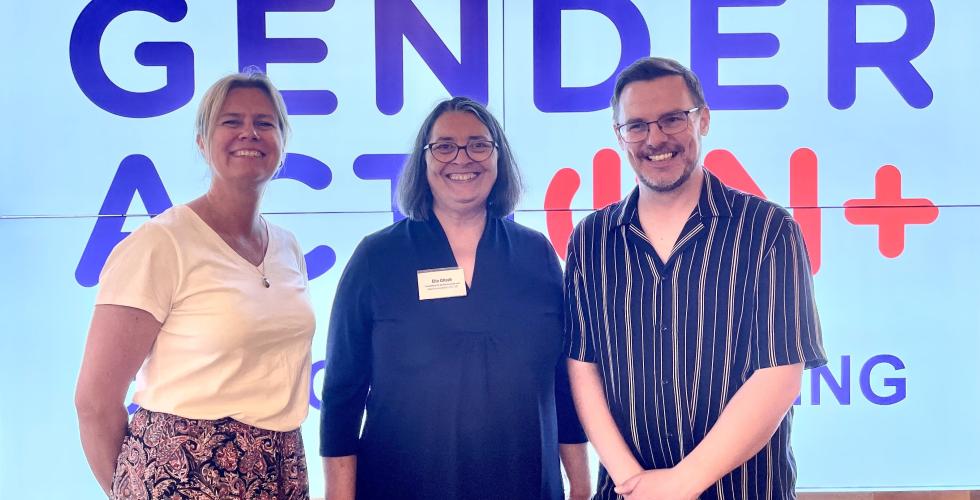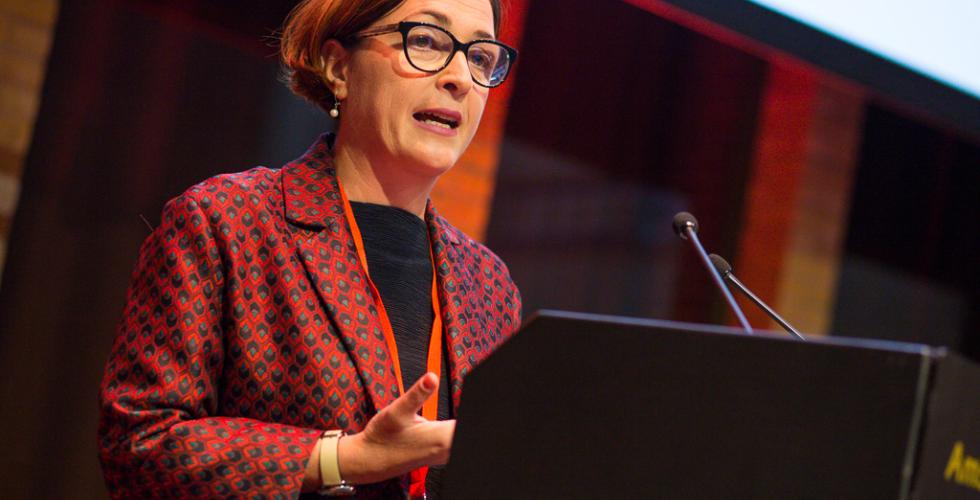EU making strides despite setbacks
In recent years, the EU has set gender equality plan requirements and launched groundbreaking actions against violence in academia. Marcela Linková nevertheless warns against reactionary forces in the EU.
“When it comes to policy adoption, we’ve never been in a better position than in the last five years,” says Marcela Linková, coordinator of GENDERACTIONplus, an EU-funded project for gender equality in research and innovation.
Linková points to a number of breakthroughs in recent years: gender equality plan requirements, actions against gender-based violence and greater focus on intersectionality.
Yet she conveys a warning:
“We’re also in danger of losing much of what we’ve achieved.”
Fears setbacks
The global situation has made Linková uneasy about the future.
“We’ve seen the emergence of anti-gender movements in many EU countries, even in countries we considered stable, like Sweden. The political situation in Poland has improved slightly, but it remains especially serious in countries such as Hungary, Slovakia and Bulgaria,” she says.
She also draws links to developments in the US under Donald Trump, where gender equality and diversity work has been rolled back, subsequently affecting research collaboration with Europe.
“The setback in the US has given momentum to reactionary forces in the EU,” says Linková, who believes we are at a crossroads.
European Commission sought to weaken GEP requirements
An indisputable sign of resistance is the proposal from the European Commission, represented by Research Commissioner Ekaterina Zaharieva, earlier this year to change the Gender Equality Plan (GEP) requirements in the Horizon Europe programme.
“A clear sign of the dangers gender equality policy is current facing”, according to Linková.
“Since 2022, public research institutions and higher education institutions have been required to have a GEP in place to apply for funding. Then there was suddenly a proposal to lower these requirements in the 2025 work programme,” explains Linková.
The proposal was quickly shot down.
“Several member states gave clear responses: Changes of this kind must first be thoroughly analysed and discussed with the professional communities that contribute to policy formulation. Fortunately, the proposal was withdrawn,” she says.
But a lot can happen, Linková emphasises, as negotiations on the regulations for the period 2026-2027 are currently ongoing. (More in the fact box.)
“We need to be vigilant and pay attention to all policy processes,” says Linková.
Groundbreaking actions against violence in academia
One area where progress has been made is in tackling gender-based violence in research and higher education. In the EU, the term gender-based violence is used to refer to everything from physical to psychological violence, including acts of discrimination or harassment based on a person’s gender.
“Prior to 2018, this was almost completely absent from EU research policy. Then, in 2020, the first document containing policy recommendations was published, and in 2024 official EU guidelines were launched based on a zero-tolerance policy,” says Linková.
In her opinion, the document is groundbreaking:
“It recognises the systemic nature of violence, i.e. that some groups, such as women, are affected due to structural inequality. The definition in the document encompasses the full spectrum, from microaggressions to serious offences. It’s based on a trauma-informed and victim-centred approach – and includes an intersectional perspective.”
“That’s a great victory. But the real work starts now: Making it work in practice – for researchers and students across Europe,” says Linková, member state co-chair of the ERA Forum’s sub-group Inclusive Gender Equality.
Gender budgeting on the agenda
Since 2012, gender equality has been a clear priority in the European Research Area’s (ERA) policy agenda. In the previous period 2022-2025, this resulted in, among other things, the introduction of a zero-tolerance policy against violence and a new framework for mainstreaming gender perspectives in research.
This work will continue in the new agenda for 2025-2027.
“We will continue our efforts to implement the recommendations of the zero-tolerance code of conduct to counter gender-based violence and the principles for mainstreaming gender perspectives in research. We’re also developing a common European system to follow up gender equality plans,” says Linková.
This is to obtain a better overview of how the plans are actually designed and implemented across member states and institutions.
Gender budgeting has been included in the EU’s research policy agenda for the first time. The new ERA Policy Agenda for 2025-2027 mentions it specifically in its actions.
Gender budgeting involves analysing and adjusting budgets to strengthen gender equality and ensure that funding is equally distributed. Linková believes that gender budgeting can become an important tool in the time ahead, both to highlight financial imbalances between genders and to identify which academic environments and groups have access to funding.
“This issue has never been raised before in EU research and innovation policy. But we know that there are differences in who applies for funding, who is awarded funding and which research fields are prioritised. So it’s absolutely necessary to look at how the money is actually distributed,” she says.

New Norwegian action plan uncertain
Although the policy agenda is not legally binding, 22 of the 27 EU countries have endorsed the gender equality efforts, along with 14 key university networks and research organisations for the period 2022-2024, according to Linková.
“That’s impressive. But the problem is that it’s not sufficiently followed up at EU level. There are no requirements for implementation and monitoring of ERA across the EU countries,” she says.
When it comes to Norway, the Ministry of Education and Research confirms that the ERA’s work also has implications for national policy.
“The policy agenda for 2025-2027 contains 19 actions, several of which build on what was developed through actions in the previous policy agenda for 2022-2024. This includes action to strengthen gender equality and inclusiveness,” writes Erik Yssen, Senior Policy Adviser at the Ministry of Education and Research’s Department for Higher Education, Research and International Affairs, in an email.
Yssen points out that the Ministry has previously developed a national action plan for the ERA for the period 2022-2024.
“Will the Ministry of Education and Research update the national ERA action plan in light of the new policy agenda?”
“Norway was one of few countries to draw up such an action plan. Most countries follow up the actions in current national processes and initiatives without such a plan. We now also have more experience of what ERA actions entail and how they can be followed up.”
“No decision has been made on a new action plan as yet,” Yssen replies.
“Gender equality as a more long-term effort”
“Gender budgeting has for the first time been specified in actions for the coming period. How do you plan to follow this up in national efforts?”
“This is something that is intended to be developed through the action in the new period. We will have to come back to whether it will be followed up nationally, and if so, how,” replies Yssen.
According to Yssen, the work on the new action for gender balance and inclusiveness could also be followed up in Norway, for example through the KIF Committee and the Research Council of Norway.
“These organisations have important tasks to perform in ‘bringing the action home’ and using it in national gender balance and equality efforts, while also contributing experience to the European cooperation,” he writes.
“In your opinion and that of the Ministry, are gender equality and diversity efforts in research policy prioritised more or less in the new compared to the previous policy agenda?”
“An important point is that gender equality and inclusiveness in the new agenda is established as a structural policy effort in the ERA and thus recognised as a more permanent, long-term effort in the ERA,” says Yssen.
Stronger commitment – to more inclusive gender equality as well?
The Senior Policy Adviser at the Ministry of Education and Research emphasises that even though the ERA actions are based on voluntary effort, gender equality work is closely monitored.
“Indicators and country reports are prepared, and a separate report on implementation is submitted to the Council of Ministers, which comprises representatives of the member states. A country report on Norway is expected to be available in the near future,” explains Erik Yssen.
The report will be prepared by a consortium led by the consulting company Technopolis.
Yssen also refers to the fact that the EU is currently considering an ERA Act, which may be introduced towards the end of 2026. This could mean that certain aspects of the cooperation, which have so far been voluntary, may become subject to regulation.
“It could mean that both member states and possibly also associated countries, such as Norway, become more strongly committed to realising the ERA.”
Such actions could include putting better arrangements in place for research careers, mobility, gender equality and inclusion.
With regard to the ERA agenda’s goal of “gender equality and inclusiveness in the ERA, notably with an intersectional approach,” Yssen points out that this could become even more important in Norway in the future.
Translated by Totaltekst.
Some examples from recent years:
- 2025–2027: Gender budgeting introduced as a new initiative in the ERA Policy Agenda.
- 2025: Launch of the Framework for the integration and evaluation of inclusive gender analysis in research and innovation content, with the aim of further mainstreaming gender perspectives in research.
- 2024: The European Commission’s ERA Forum’s sub-group adopts a common zero-tolerance policy on gender-based violence in research and higher education, emphasising prevention, protection and accountability.
- 2022: Gender equality plans (GEPs) become a requirement for research organisations and public sector bodies applying for funding from Horizon Europe.
- 2020: Gender-based violence is recognised as an issue for the first time. The Standing Working Group on Gender in Research and Innovation presents recommendations.
The European Research Area (ERA) was launched by the EU in 2000 to bolster European cooperation on research policy. Norway has taken part in developing the ERA from the offset.
The previous policy agenda for the ERA was for the period 2022-2024. The new policy agenda is for 2025-2027.
The Ministry of Education and Research has drawn up a national action plan for the ERA for 2022-2024. Read more about the plan in our news article (both in Norwegian).
The zero-tolerance code of conduct was adopted by the ERA Forum’s sub-group Inclusive Gender Equality, which brings together member states, the European Commission and ERA stakeholders. Several major university networks and research organisations have already signed a pledge to comply with the guidelines.
Intersectionality
Intersectionality is an established concept in both Norway and the EU, and is about how several different grounds for discrimination interact.
Read more about intersectionality on our website and news articles.






